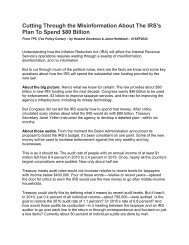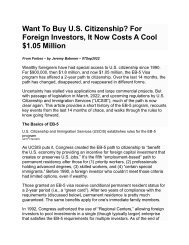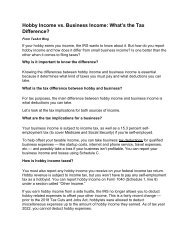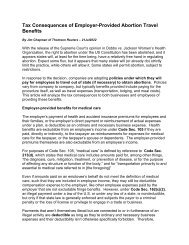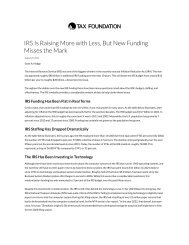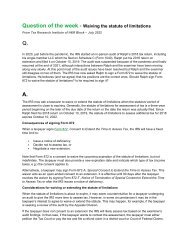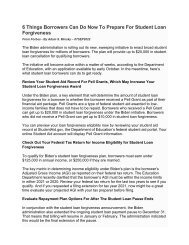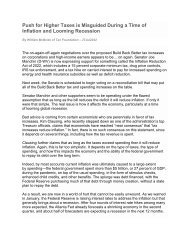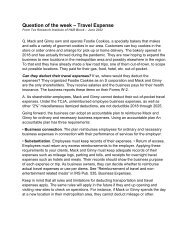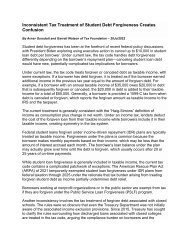The People vs Al Capone
You also want an ePaper? Increase the reach of your titles
YUMPU automatically turns print PDFs into web optimized ePapers that Google loves.
<strong>The</strong> <strong>People</strong> <strong>vs</strong>. <strong>Al</strong> <strong>Capone</strong><br />
Full of betrayal, bribery, and bootleggers, explore the events leading up to the tax evasion trial that<br />
brought down <strong>Al</strong> <strong>Capone</strong> on the 100th anniversary of Prohibition.<br />
By: <strong>Al</strong>bert <strong>Al</strong>len / January 15, 2020<br />
One hundred years ago, the 18 th Amendment to the Constitution entered into force, prohibiting the<br />
production, sale, and transportation of “intoxicating liquors” in the U.S.* With Prohibition came the rise of<br />
bootlegging and other criminal enterprises. One of the most notable gures from this time was <strong>Al</strong><br />
"Scarface" <strong>Capone</strong>—who, along with his crime family, was brought down not for his numerous underlying<br />
crimes (bootlegging, loan sharking, extortion, prostitution) but for tax evasion on the revenue generated<br />
from those crimes.<br />
<strong>The</strong> story behind the FBI bringing down the legendary <strong>Capone</strong> and the development of tax law is<br />
fascinating, to say the least. Full of betrayal, bribery, and bootleggers, the events leading up to the trial are<br />
worth exploring.<br />
Generally, all income is taxable, even when it’s earned illegally<br />
<strong>The</strong> fact that most income is taxable is widely known, but it may surprise some to learn that the IRS<br />
expects taxpayers to report income they’ve earned from illegal activities. Even more surprising is to<br />
imagine that one of the most notorious gangsters in American history was brought down by fairly dry and<br />
tedious tax laws.
After the 16 th Amendment was ratied in 1913, Congress enacted the Revenue Act of 1913 stating that<br />
gross income included “gains, prots, and income derived from the transaction of any lawful business<br />
carried on for gain or prot, or gains or prots and income derived from any source whatever.” In this<br />
context, the word “lawful” provided an argument that income gained from an unlawful business was not<br />
gross income to be taxed. Congress addressed this issue in 1921 by dropping the word lawful from its<br />
denition of gross income. By 1921, there was little doubt that income gained from illegal activities was<br />
still subject to taxes. However, a challenge of this law occurred in 1927 that ended up paving the way to<br />
taking down <strong>Al</strong> <strong>Capone</strong>.<br />
A bootlegger goes to the Supreme Court<br />
<strong>Al</strong> <strong>Capone</strong> was born in Brooklyn, New York in 1899 and quit school in the sixth grade to join a notorious<br />
street gang headed by <strong>Capone</strong>’s mentor Johnny Torrio. <strong>Capone</strong> was successful in moving through the<br />
ranks and eventually took over Torrio’s bootlegging operations in Chicago in 1925. Two years later, a<br />
bootlegger in South Carolina would challenge the taxability of illegal income and set in motion the<br />
eventual takedown of <strong>Capone</strong>.<br />
In United States v. Sullivan**, a bootlegger out of South Carolina argued before the Supreme Court of the<br />
United States that the Fifth Amendment of the Constitution protected him from ling a return to report<br />
income from his illegal business. Per the Fifth Amendment, no person shall be compelled in any criminal<br />
case to be a witness against himself. Sullivan argued that disclosing illegal income on his tax return<br />
would be self-incriminating and thus would violate Sullivan’s constitutional right protected under the Fifth<br />
Amendment.<br />
In an opinion delivered by Justice Holmes, the Supreme Court ruled that applying the Fifth Amendment in<br />
this way was pressing it too far. Justice Holmes went on to say that it would be an extreme, if not an<br />
extravagant, application of the Fifth Amendment to say that it authorized a man to refuse to state the<br />
amount of his income because it had been made in crime. Further, the Supreme Court concluded that<br />
Sullivan “could not draw a conjurer’s circle around the whole matter by his own declaration that to write<br />
any word upon the government blank would bring him into danger of the law.” In other words, taxpayers<br />
can’t just claim that providing information will incriminate them and be done with the matter.<br />
A Treasury Agent builds the case against <strong>Capone</strong><br />
<strong>The</strong> Supreme Court decision striking down the Fifth Amendment argument against reporting illegal<br />
income on a tax return opened the door to use this procedure against the other bootleggers in the<br />
country. After the Sullivan decision, President Herbert Hoover instructed the Secretary of the Treasury<br />
that he wanted <strong>Capone</strong> in jail. Treasury Agent Frank Wilson was appointed to the job of building the case<br />
of tax evasion against <strong>Capone</strong>. <strong>Capone</strong> hadn’t claimed any income from his business dealings on his<br />
returns for 1924 through 1929 and insisted he earned little or no income, while his crime syndicate<br />
grossed an estimated $105 million per year (not adjusted for ination).<br />
While Agent Wilson was building his tax evasion case out of the Chicago Post Oce Building, the Justice<br />
Department assigned a small team of Prohibition agents to target illegal breweries. This small team led<br />
by Eliot Ness became famous for its efforts and would be later known as “<strong>The</strong> Untouchables,” with a
feature lm of the same name released in 1987. While Eliot Ness and his team brought about nancial<br />
damage to <strong>Capone</strong>’s operations and around 5,000 indictments under the Volstead Act against <strong>Capone</strong> in<br />
June 1931, it was the tax case Agent Wilson built that ultimately brought down <strong>Capone</strong>.<br />
Wilson rst went after associates of <strong>Capone</strong>. One associate, who became one of the key informants, was<br />
“Easy Eddie” O’Hare.*** Easy Eddie ran dog-racing tracks for <strong>Capone</strong> in Chicago as well as Florida and<br />
Massachusetts. Another informant was Leslie Shumway, the author of seized ledgers of one of <strong>Capone</strong>’s<br />
gambling establishments. And importantly, Fred Reis testied, after four days in solitary connement, that<br />
Reis purchased numerous cashier checks and turned them over to <strong>Capone</strong>’s employees and that these<br />
checks represented <strong>Capone</strong>’s net prots at his Cicero gambling hall.<br />
<strong>The</strong> trial of the century<br />
With the witnesses’ testimony in-hand, Agent Wilson told U.S. Attorney George Johnson that they were<br />
ready to move forward with charges against <strong>Capone</strong>. After federal judge Hon. James Wilkerson denied a<br />
plea deal, the case went to trial in 1929. Even before the trial began, <strong>Capone</strong> tried to swing the odds in his<br />
favor. <strong>The</strong> informant O’Hare passed information along to Wilson that <strong>Capone</strong> had a list of prospective<br />
jurors and was already bribing them. Using this information, Judge Wilkerson switched out the entire<br />
panel of jurors with the jurors from a different trial on the morning of the rst day of the <strong>Capone</strong>’s trial.<br />
Besides bribing the jury, it was also suspected that <strong>Capone</strong> brought his personal bodyguard, Philip<br />
D’Andrea, to the courtroom to sit behind him and intimidate witnesses as they took the stand. At the<br />
beginning of the trial, Judge Wilkerson ordered no guns in the courtroom. Under this order, special agents<br />
escorted D’Andrea out of the courtroom during the trial and searched him. <strong>The</strong>y found a loaded revolver<br />
and extra cartridges, and D’Andrea was immediately found in contempt of court and placed in jail for the<br />
remainder of the <strong>Capone</strong> trial.<br />
While <strong>Capone</strong> had tried his best to sway the jury through any means necessary, it was not enough in the<br />
end. <strong>The</strong> government’s evidence of <strong>Capone</strong>’s illegal income that was not stated on his income tax returns<br />
was overwhelming. <strong>The</strong> jury found <strong>Capone</strong> guilty of ve of the 23 charges against him and Judge<br />
Wilkerson sentenced <strong>Capone</strong> to 11 years, the longest term ever handed down for tax evasion at that<br />
point. On his way out of the courtroom, <strong>Capone</strong> shouted, "I'm not through ghting yet!" But he was<br />
nished--<strong>Capone</strong>’s appeals were unsuccessful, he was in prison for eight years before his release in 1939,<br />
and died of a stroke in Palm Island, Florida in 1947.<br />
Conclusion: If crime pays, report the income or face evasion<br />
charges<br />
After <strong>Capone</strong>’s trial, tax evasion became a tried and true method to take down other notorious gangsters.<br />
Besides providing the government a safe way to put the nation’s most dangerous criminals behind bars,<br />
<strong>Capone</strong>’s trial brought about another interesting side effect. In 1931, the IRS collected about $1.1 million<br />
more in collections from delinquent returns as compared to 1930, due, in part, to the outcome of the<br />
<strong>Capone</strong> trial.<br />
* <strong>The</strong> 18 th Amendment was repealed in 1933.<br />
** U.S. v. Sullivan, 274 U.S 259 (1927)<br />
*** Eddie O’Hare was eventually killed by two gunmen in a passing car years later. His son, Edward, was
given the Congressional Medal of Honor for his bravery as a naval aviator in World War II. Chicago’s<br />
O’Hare International Airport is named in his honor.<br />
<strong>Al</strong>bert <strong>Al</strong>len<br />
<strong>Al</strong>bert <strong>Al</strong>len is a tax research analyst at <strong>The</strong> Tax Institute. <strong>Al</strong>bert coordinates<br />
a research team focused on real property and cancellation of debt issues.



